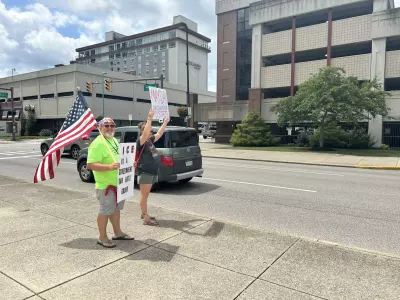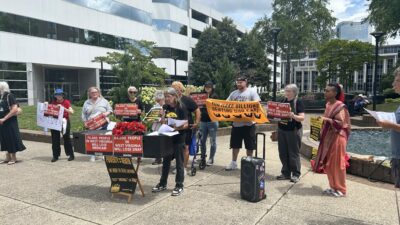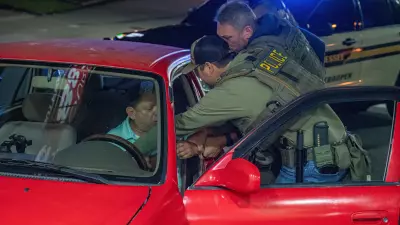More than a week after Trump signed the federal legislation into law, demonstrators in Charleston, West Virginia, staged a protest of cuts to federal food assistance and health care in the Big, Beautiful Bill.

About two dozen protesters gathered outside the downtown office of Sen. Shelley Moore Capito, R-W.Va. Some of them were also expected to go to Republican Sen. Jim Justice’s Charleston office following the demonstration.
West Virginia’s entire congressional delegation, all Republicans, voted for the budget reconciliation bill, which includes historic cuts to Medicaid and the Supplemental Nutrition Assistance Program. In the Mountain State, nearly 500,000 people get their health care coverage from Medicaid. About 277,000 state residents rely on SNAP.
“A budget is a moral document, and this one is soaked in cruelty,” Pam Garrison, state tri-chair of the West Virginia Poor People’s Campaign, said during the event. “We come from many traditions, but we share one sacred call to care for the vulnerable, to welcome the stranger, to lift up the common good. Repeal this law. Repair the harm and reinvest in dignity.”
The bill extends and expands a 2017 tax law to keep individual income tax rates at the same level, according to reporting by States Newsroom. It also makes permanent some tax breaks on business investments and research and development costs. To do so, the legislation slashes funding to the Medicaid program and shifts significant costs of SNAP to the states for the first time.
In a statement Monday, Kelley Moore, a spokeswoman for Capito, said that the senator believes everyone should have the right to make their voices heard in a respectful and peaceful way.
“The Big Beautiful bill, which is now law, focuses on the safety, security and prosperity that the American people want and need,” Moore said. “This comprehensive package reflects the priorities shared with President Trump — who West Virginians overwhelmingly supported in the recent election.”
Nationally, roughly 17 million people are expected to lose their health care by 2034 due to the implementation of work reporting requirements for Medicaid recipients and changes to the Affordable Care Act marketplace, according to the Center on Budget and Policy Priorities.
In West Virginia, about at least 75,000 Medicaid recipients are expected to lose their coverage, according to an analysis by Repairers of the Breach. The bill will increase the state’s cost of SNAP benefits based on their error rate. If those costs are based on the state’s 2024 error rate, it would cost West Virginia more than $50 million, according to the Center on Budget and Policy Priorities.

Art Lane, of Belle, W.Va. participates in a protest outside Capito’s office Monday, July 14, 2025. (Lori Kersey | West Virginia Watch)
Art Lane, of Belle, was among the about two dozen people who participated in the protest.
He pointed to research by Yale University and the University of Pennsylvania that estimates the legislation could lead to 51,000 deaths per year due to loss of health care coverage, disenrollment of 1.38 million low-income Medicare beneficiaries and the repeal of federal nursing home staffing rules.
“Think how many of [those deaths] are going to be West Virginians?” Lane said. “West Virginia is one of the most neediest states in the country, and there’s so many people here, so many families who depend on SNAP, who depend on Medicaid, so many disabled people, elderly people.”
“I’m out here fighting for the people and standing up for the people who are less fortunate,” he said.
The protest was part of a series of events held in 11 southern states by the Repairers of the Breach, a national organization led by Bishop William J. Barber II that supports “moral leaders who uplift our deepest moral and constitutional values to redeem the heart and soul of America.”
“Everyone that they hurt with this bill, we will organize,” Barber said in a statement Monday. “Through Jim Crow, the Civil Rights Act, the Voting Rights Act, and beyond, history has consistently taught us that the poorest and most marginalized communities have a profound ability to create change — even when the future seems the bleakest. Today is no different. Yes, lawmakers have succeeded in codifying one of the most morally-bankrupt pieces of legislation in our history. But in doing so, they’ve laid the groundwork for a movement that is truly by and for poor and working class people. If we mobilize just a fraction of these people, we can transform our nation’s entire landscape.”
Similar demonstrations were held in Alabama, Mississippi, Florida, Texas, Georgia, South Carolina, Tennessee, Louisiana, Virginia and North Carolina.







